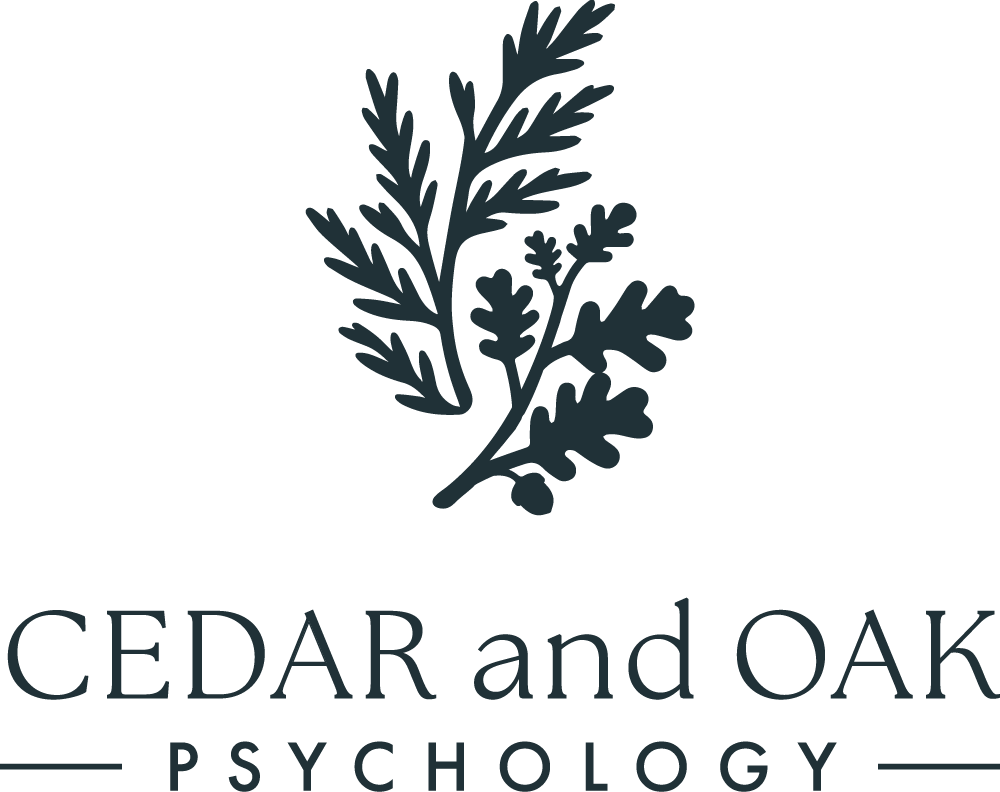
Diagnostic and Therapeutic Assessment

Two Distinct Approaches to Psychological Evaluation
At Cedar & Oak Psychology, we offer two specialized assessment services for clients referred by other mental health professionals: Diagnostic Assessment and Therapeutic Assessment. Each service has distinct goals and approaches to meet different clinical needs.
Comparing Our Assessment Services
Diagnostic Assessment
Diagnostic Assessment follows the traditional information-gathering model of psychological testing. The primary goal is to collect accurate data to clarify diagnoses, answer specific referral questions, and develop treatment plans. This approach focuses on describing clients according to established categories and dimensions, facilitating communication between professionals, and making informed decisions about treatment.
Therapeutic Assessment
Therapeutic Assessment is a semi-structured, collaborative approach developed by Dr. Stephen Finn. Beyond gathering diagnostic information, it's designed to be therapeutic in itself – helping clients gain new insights, reduce symptoms, increase self-esteem, and motivate them for further treatment.
Key Differences Between Our Assessment Services
Diagnostic Assessment
Focus on accurate diagnosis and clinical recommendations
Shorter timeline (typically 2-3 sessions)
Standardized administration with limited client participation in interpretation
Formal written report as primary deliverable
Emphasis on expert opinions and recommendations
Most appropriate for straightforward diagnostic questions
Typically lower cost
Therapeutic Assessment
Focus on both diagnosis and creating therapeutic change
Longer timeline (typically 4-6 sessions)
Collaborative process with client as active participant
Includes therapeutic feedback sessions and personalized client letter
Emphasis on client discoveries and self-understanding
Ideal for complex cases or when therapeutic benefit is a primary goal
More intensive investment of time and resourcesnt discoveries and self-understanding
Benefits for Your Clients
Diagnostic Assessment Benefits
Clear Diagnostic Picture: Precise identification of psychological conditions
Evidence-Based Treatment Planning: Targeted recommendations based on assessment findings
Medication Guidance: Information to assist with medication decisions
Educational/Workplace Accommodations: Documentation for support services
Efficient Process: Streamlined approach for straightforward diagnostic questions
Cost-Effective: Lower overall cost for cases requiring primarily diagnostic clarity
Therapeutic Assessment Benefits
Research has consistently shown that Therapeutic Assessment delivers additional meaningful benefits:
Reduced Symptoms: Significant reductions in psychological distress
Increased Self-Esteem: Clients report feeling better about themselves
Greater Hope: Clients develop more optimistic views of their challenges
Enhanced Motivation: Increased readiness for therapy and treatment
Better Self-Understanding: Clients gain new insights into their patterns and challenges
Stronger Therapeutic Alliance: Prepares clients for a positive therapy experience
Diagnostic Assessment Process
Initial Consultation: Brief review of referral questions and Client history
Test Administration: Standardized psychological tests selected to address specific referral questions
Clinical Interview: Structured interview to gather additional diagnostic information
Analysis and Interpretation: Expert analysis of test results and clinical data
Written Report: Comprehensive report with diagnosis, clinical impressions, and treatment recommendations
Feedback Session: Brief feedback session to explain findings and recommendations
Therapeutic Assessment Process
Initial Consultation: Meeting with referring clinician to understand clinical history and assessment goals
Initial Consultation: Extended meeting with the client to understand their questions and concerns
Collaborative Goal-Setting: Together with the client, we finalize specific questions the assessment will address
Standardized Testing: Administration of appropriate psychological tests
Extended Inquiry: Collaborative exploration of responses, engaging the Client in understanding their test results
Assessment Intervention: Designed experiences to help clients discover insights about themselves
Summary/Discussion Session: Interactive discussion of findings in an accessible, supportive manner
Written Feedback: Clients receive both a clinical report and a personalized letter summarizing insights
Follow-Up Session: Check-in to see how insights are being integrated and answer questions
When to Refer for Each Service
Consider Diagnostic Assessment When:
You need clear diagnostic clarification, especially complex cases with multiple and/or conflicting historical diagnoses
Treatment planning considerations include monotherapy vs. combination approaches
Documentation is needed for accommodations or services
A brief, focused assessment is sufficient
Time or cost constraints are significant factors
The Client primarily needs expert opinions rather than self-discovery
Consider Therapeutic Assessment When:
The Client has not responded adequately to previous treatments
The case involves complex or unclear diagnostic presentations
The Client feels stuck or unsure about their treatment direction
The Client is hesitant about entering therapy
Increasing self-awareness and motivation are key goals
Relationship or engagement issues have hindered previous treatments
The Client could benefit from a deeper understanding of their patterns
What You'll Receive
For Diagnostic Assessment Referrals:
A comprehensive clinical report with:
Diagnostic impressions based on DSM-5 criteria
Test results and interpretation
Specific treatment recommendations, including suggestions for outcome measures
Documentation for accommodations (if needed)
For Therapeutic Assessment Referrals:
A comprehensive clinical report as above, plus:
Insights into therapeutic approach and relationship factors
Analysis of patterns that may affect treatment engagement
Detailed explanation of the Client's subjective experience
Information about what therapeutic interventions resonated
A separate personalized letter for the Client
Feedback on potential challenges and how to address them
Consultation on how to incorporate insights into ongoing treatment
Getting Started
To refer a Client for either Diagnostic or Therapeutic Assessment, or to discuss which approach might best meet your Client's needs, please contact us using the form below.
Theoretical Foundations
Our Diagnostic Assessment services are grounded in evidence-based psychometric principles and current diagnostic frameworks.
Our Therapeutic Assessment approach is informed by the groundbreaking work of Stephen Finn and Mary Tonsager (1997), who demonstrated that psychological assessment can function both as an information-gathering tool AND as a brief therapeutic intervention that produces meaningful client change.
Licensed Providers
Hannah K. Howell, PhD, JD, MSCP
[CA PSY17487 / WA PY 61076404]
[PSYPact/APIT 20176]
Alison Bateman, PhD, C-DBT
[CA PSY19916]
Paula Wilbourne, PhD
[HI PSY-1029]

We provide personalized therapy, advanced professional training, and expert consultation, leveraging decades of clinical expertise and research to address complex mental health challenges.
Licensed Provider
Hannah K. Howell, PhD, JD, MSCP [CA PSY17487 / WA PY 61076404] [PSYPact/APIT 20176]
Alison Bateman, PhD [CA PSY19916]
Paula Wilbourne, PhD [HI PSY-1029]
©2025 by Cedar and Oak Psychology | Privacy Policy | Terms & Conditions
